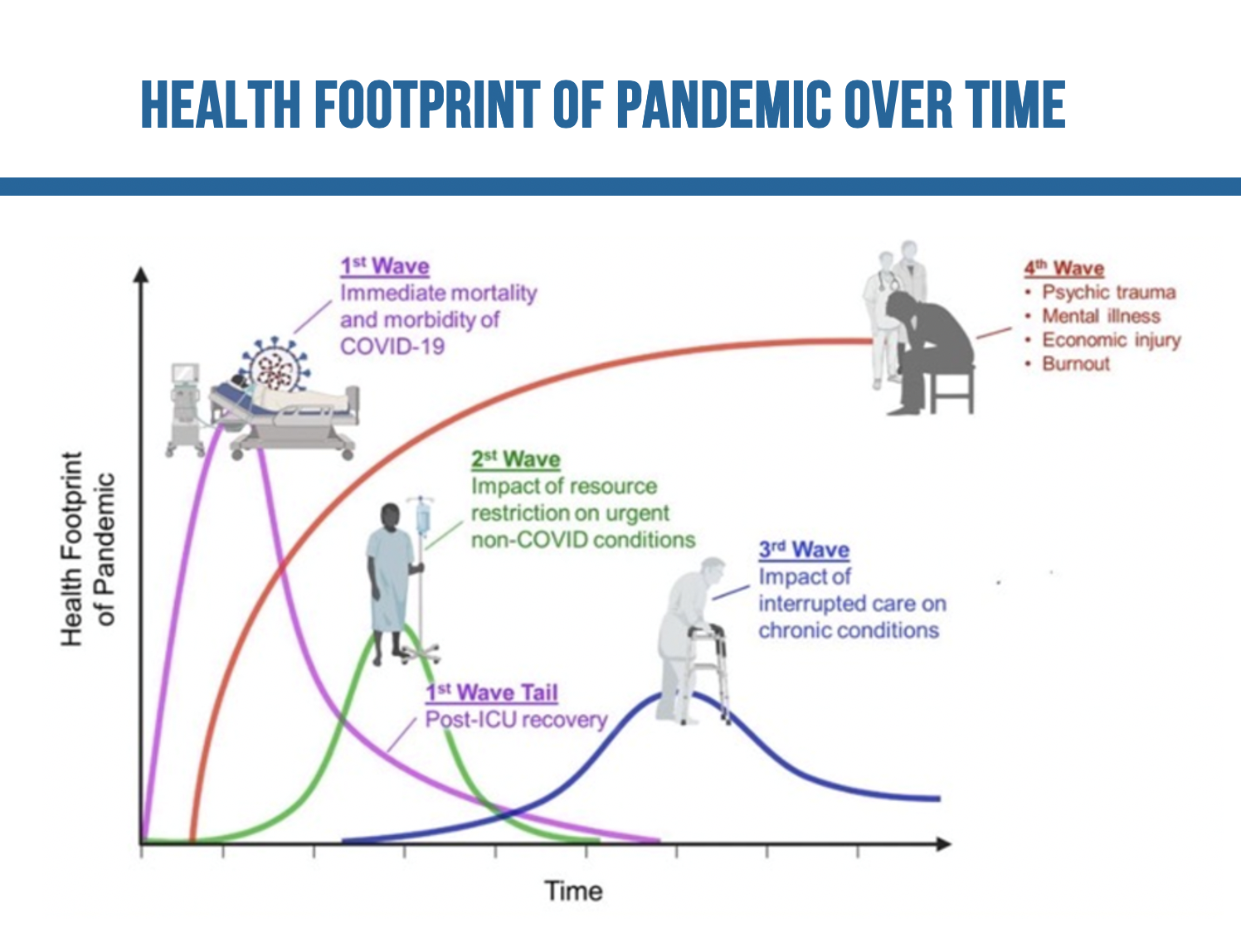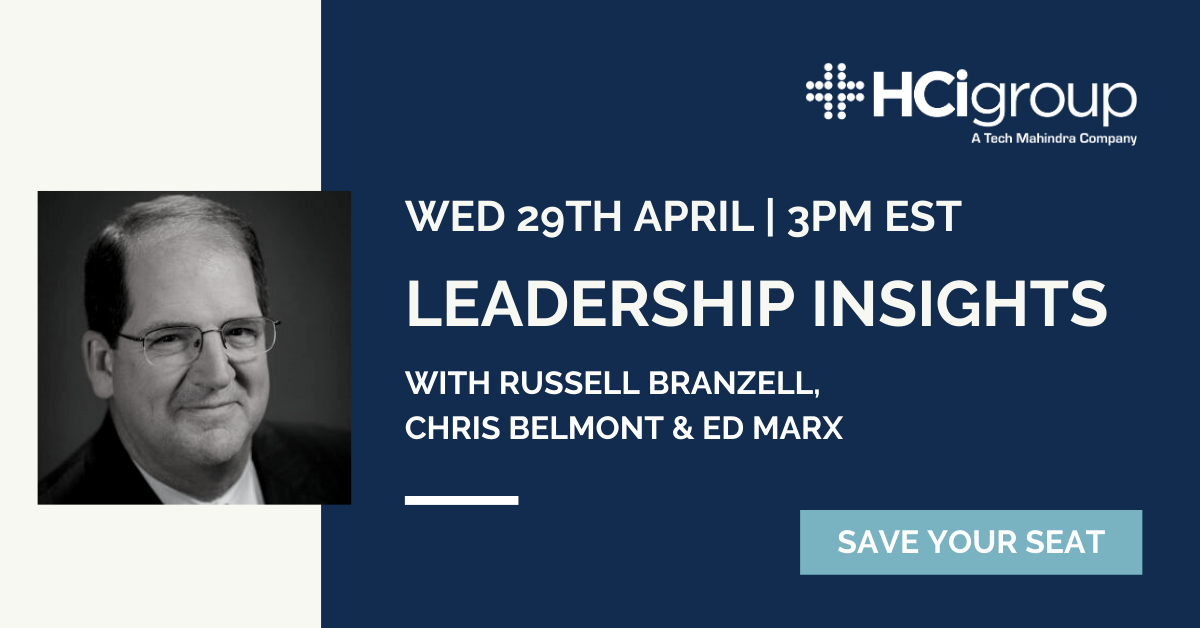Leadership Insights with Russell Branzell
.png)
.png?width=1200&name=Digital%20unplugged%20(21).png)
In the recent instalment of The HCI Group leadership webinar series, Ed Marx was joined by Russell Branzell and Chris Belmont to discuss healthcare insights and what the future will look like for organizations and leadership within in the industry. This interactive series was established in light of the COVID-19 pandemic to interview leaders on lessons learned and key advice for Healthcare IT leadership during this crisis. This edition hosted Russell Branzell, CEO and president of the College of Healthcare Information Executives (CHIME) and its affiliate associations. Ed was also joined by Chris Belmont, Executive Vice President of Operations & Strategy at The HCI Group, who co-interviewed during the webinar. Chris has more than 35 years of leadership experience in some of the world's most respected patient care organizations and is the former Senior Vice President and Chief Information Officer of MD Anderson Cancer Center in Houston.
When introduced to the webinar audience, Russ firstly remarks on the importance of discussing leadership insights during this time: “These are trying times for everybody across the globe. We’ve spent a lot of time talking to our leaders, and from venders to providers this pandemic is seen as both the worst of times for the organizations, but the best of times for leadership. This is a great opportunity to share these thoughts with you today, and it is a pleasure to be a part of this webinar today.”
Leading through and beyond COVID-19
Ed: It’s great to have you with us, Russ. I want to get things started not by considering current COVID leadership but looking further into the future at post-COVID requirements. What will the post-COVID legacy be? Where are we headed after all of this and what do you believe is required of leadership post-COVID?
 Source: Unknown
Source: Unknown
One of the things that we are starting to see, as illustrated in the graph here, is the concept that we will shift from one curve immediately to the second curve, or even a transitional phase in-between. We are starting to hear from some of our leaders across the globe who are further ahead in the pandemic than the United States and in some cases exiting out of the first curve, that this isn’t a simple two curve process. Our leaders are going to have to lead from a long-term impact perspective, at least through the three primary curve ways that we are hearing about and are listed in this chart.
We’re talking to some of our CIOs in Italy, in particular one from Bergamo in Northern Italy where the country was most affected by the pandemic and where hospitals were overwhelmed with patients within a matter of days. Whilst they are now seeing their COVID-19 numbers come down, they are also seeing the rest of the world ramping up. However, as much as we were stretched to ramp up our leadership and COVID-19 response, driven by a war fighting mentality and adrenaline, these next waves are also going to be significantly taxing on our systems. You may need to keep your COVID response up whilst also starting to reintroduce some of the traditional functions within your facility. Ambulatory care, surgeries and traditional inpatients are all examples of the services that got put on hold in most facilities whilst we addressed the pandemic. At the exact same time we have leaped so far forward from a leadership perspective, that all of a sudden, we have normalized services like virtual care, telemedicine and remote working as part of our traditional operations. Through COVID-19 these services have been required and now they need to become part of normal operations.
The legacy of leadership through COVID-19 is going to be how we reacted to the original threat and how we lead our organizations through this fundamental change in the way that healthcare is now and will be delivered in the future. We have not heard a single leader anywhere in the world state that they believe that we will return to the way things were before the pandemic. All of them believe that our responsibility now is to lead healthcare organizations quickly to grow, mature, change and normalize what has been done during this pandemic.
The role and the reaction of CIOs through COVID-19
Chris Belmont: With the pressure that CIOs have been under leading up to this event and with this event being unplanned, how do you think CIOs have responded overall? Is there anything they could have done to be more prepared?
Personally, I have been impressed with the step up that CIOs have made during this time. As I mentioned, we at CHIME have had the chance to speak to people from all over the world. In some cases, we are many years behind the traditional adoption and maturity of the organizations and leaders in some of our more developed countries. What I have seen across the board is the reaction has been unbelievably swift. The leadership skills they have showed have been excellent despite this being some of the most trying times they will have ever experienced.
I’ve also spoken with a CIO who mentioned that they worked through hurricane Irma and has said that every day of working through this pandemic feels like “a new Irma”. This seasoned CIO who has been in the industry for many years has said that they were not ready for that pace of repetitive stress. Healthcare has been a pretty slow, methodical, maturing industry for many years, and some would say too slow. It is pretty clear that in the last 3-5 weeks, we’ve have implemented about 3-5 years’ worth of digital transformation work in order to be able to manage and address this pandemic. That pace is unsustainable, but we will probably need to sustain it for a while longer. Behavioural and mental change is what is most needed in order to do this, as the skills and the technology were always there...
Want to know more? Click here to watch the webinar recording.

